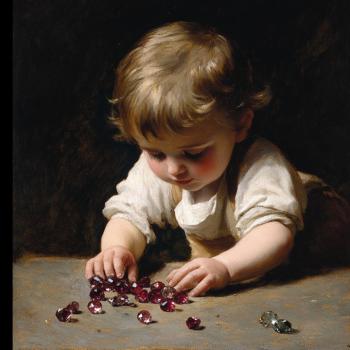
Saying 19: Jesus said, “Blessed is he who came to be before he came to be. If you become my disciples and listen to my words, these stones will serve you. For there are five trees for you in Paradise which remain unchanged in summer and winter and whose leaves do not fall. Whoever knows them will not taste death.”
Right from the start, Jesus shares a beatitude that defies comprehension. How can anyone possibly come to be before they come to be? Unless they didn’t need to come to be in the first place because they have already existed from eternity, of course. In that case the statement would make sense.
One cannot help but be reminded of the statement from the Gospel of John where Jesus is reported to say, “Most assuredly, I say to you, before Abraham was, I AM.” [John 8:58]
In this passage, Jesus is nearly stoned to death for blasphemy because he makes the claim that, before he was born into his physical body, he was already alive and co-existent with God.
In our saying above, Jesus turns this around to his own disciples and suggests that they, too, are blessed if they come to realize that they also “came to be” in the eternal life of Christ before they ever “came to be” in their physical bodies.
Another way to phrase this might be something like: “Blessed are they who realize that they have always been one with Christ before they ever came to be born in the flesh.” Or maybe, “Blessed are they who know that they have been born of the Spirit before they were ever born.”
We might be tempted to read this beatitude as applying only to Jesus directly, but so much of what Jesus says to his disciples in the Gospel of Thomas is aimed at helping them understand their own Divinity and Oneness with God that it would be foolish to do so.
Yes, this blessing applies to Jesus, but it also applies to all of us if we come to the realization that our coming into being predates our physical birth here in this life.
After pronouncing this blessing, Jesus goes on to offer a promise to those who have chosen to become his disciples:
“If you become my disciples and listen to my words, these stones will serve you.”
This saying seems to parallel the passage in Luke 19:40 where Jesus claims that “…if these [people] stop speaking, the stones will cry out!”
In that case, the stones are said to cry out because the prophecies about Jesus entering Jerusalem on the back of a donkey as the people shout “Hosanna!” must be fulfilled, and if the people won’t do their part, the rocks themselves would be compelled to step in and complete the task.
In this saying, however, there is no context for why “these stones will serve” those who become disciples of Jesus and listen to his words. Perhaps the intention is to suggest that all of creation, including even the stones of the ground, will serve and honor those who truly put the words and teachings of Jesus into practice.
Following this statement, Jesus continues:
“For there are five trees for you in Paradise which remain unchanged in summer and winter and whose leaves do not fall. Whoever knows them will not taste death.”
What are these “five trees in Paradise” that Jesus speaks of here? Honestly, no one really knows. There are no detailed explanations provided in either this Gospel of Thomas, or in any other Gnostic texts or early Christian literature that we know of. But, references to these five trees are not uncommon. For example, in the Manichean Psalm Book there is mention of “five trees that are in paradise…in summer and winter.” [MPB, Ch. 161: 17-29] But, no explanation is given as to what those five trees are called or what they represent.
One suggestion is that these five trees in Paradise correspond to the five senses in the human body: Sight, Sound, Taste, Touch and Smell. One Gnostic text known as The Acts of Thomas mentions “…the five members of mind.” [Ch. 27], and according to 8th Century Syrian apologist, Theodore bar Khoni the 5 minds are the equivalent to mad’a (reason), hauna (sanity), re’yana (mindfulness), tar’itha (intention), and mahshebhatha (imagination).
Still another early Christian sect, the Naassenes, believed that “paradise was the human head” and the “five trees…[corresponded to] the five senses which produce one’s internal world view.” [See Five Trees entry, Wikipedia; https://en.wikipedia.org/wiki/Five_Trees#:~:text=According%20to%20the%20Naassenes%2C%20paradise,or%20return%20to%20paradise%2Funity]
However, for most Gnostic believers, the five senses of the body were more synonymous with the human ego which would be seen as a hindrance to enlightenment, not the result of it.
Strangely enough, there is a Hindu reference to the Five Trees of Indra’s Paradise which surround his garden [Nandana] in his paradise [Svarga] which are identified as:
- Mandara: A tree with scarlet flowers whose shade relieves physical ailments and mental stress.
- Parijata: A tree with bark of gold, leaves of copper color, and fragrant, rejuvenating fruit which arose out of the ocean of milk.
- Samtanaka: A tree of wonder having leaves which promote fertility in men.
- Haricandana (Sandalwood): Well known for its fragrance and cooling effect, it keeps evil spirits at bay.
- Kalpa Vrksa (Kalpa Taru): The tree of eternity which is frequently mentioned in Sanskrit literature for its wish-fulfilling quality.
Could these five trees be what Jesus is referring to in our saying from the Gospel of Thomas? Perhaps, but such an obscure reference is unlikely. Especially since we have no clues from any other Nag Hammadi texts that refer to Hindu scriptures.
So, what are we left to conclude? Either that those who followed Jesus had some unspoken inside knowledge of what was meant by reference to the five trees in paradise, or that it is intentionally an obscure metaphor meant only to suggest an abundance of fruit from enchanted trees that are available to everyone who follows the words of Jesus.
We cannot fail to mention the most obvious parallel to the trees that grow beside the River of Life that flows from the Throne of God in the book of Revelation:
“Then the angel showed me the river of the water of life, as clear as crystal, flowing from the throne of God and of the Lamb down the middle of the great street of the city. On each side of the river stood the tree of life, bearing twelve crops of fruit, yielding its fruit every month. And the leaves of the tree are for the healing of the nations. No longer will there be any curse. The throne of God and of the Lamb will be in the city, and his servants will serve him. They will see his face, and his name will be on their foreheads. There will be no more night. They will not need the light of a lamp or the light of the sun, for the Lord God will give them light. And they will reign for ever and ever.” [Rev. 22: 1-5]
The symbology here is cryptic and, as with the reference here in Thomas’s Gospel, left unexplained; how can a single tree grow on both sides of the same river? No answer is given. Only the detail that the singular tree shall bear fruit every month, year-round without fail, and that its leaves are for the healing of the nations – the enemies of God.
Perhaps both sayings are meant to evoke a sense of wonder and awe; of curiosity and mystery, without defining every single detail for us. The bottom line, in both cases, is that those who follow the way of Jesus will find themselves in a paradise filled with an abundance of life, and sustenance, and they will experience no hunger, or lack of any kind.
So, we are blessed when we come to understand that we have come to be before we came to be, and that by following Jesus all of creation now will serve us and all of paradise later will sustain us and fulfill us in every possible way.
What more could we or anyone else possibly ask for?
**
THE INNER CIRCLE: LIVE ZOOM SESSION
Sept. 10th at 2pm MT
As an INNER CIRCLE subscriber, you’re invited to join me for a private live Zoom conversation on Saturday, Sept. 10th at 2pm MT to discuss the sayings of Jesus from the Gospel of Thomas, Gnosticsm, Nonduality, and more.
Please RSVP by sending your “YES” email to me at: [email protected]
Once I receive your confirmation, you’ll be sent a private Zoom link to attend this exclusive conversation.
Hope to see you there!
**
Keith Giles is the author of the hot new bestseller, SOLA MYSTERIUM: Celebrating the Beautiful Uncertainty of Everything, available now on Amazon. Keith is also the host of Second Cup with Keith [a new solo podcast available now on the Ethos Radio App, for Apple and Android and on Spotify.













